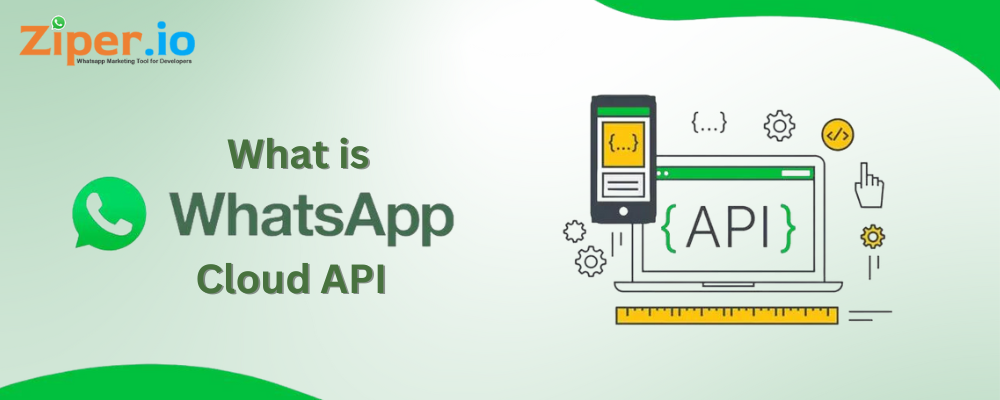What is WhatsApp Cloud API All that you need to know 2023

Communication holds immense importance in both personal and professional realms, particularly in the context of the present digital era. Messaging apps have become an integral part of our daily lives, connecting people across the globe instantaneously. WhatsApp, with its massive user base, has emerged as one of the most popular messaging platforms. To enhance user experiences and provide seamless integration, WhatsApp has introduced the WhatsApp Cloud API. In this article, we will delve into the details of the WhatsApp Cloud API, exploring its features, benefits, and how it revolutionizes communication.
WhatsApp Cloud API is a powerful tool provided by Ziper.io that allows developers to integrate WhatsApp's messaging capabilities into their own applications or services. With this API, businesses can enhance their customer interactions by leveraging the popularity and convenience of WhatsApp as a messaging platform.
How Does the WhatsApp Cloud API Work?
The WhatsApp Cloud API enables developers to send and receive messages, images, videos, documents, and other multimedia content programmatically through Ziper.io. It utilizes a RESTful architecture, allowing developers to interact with WhatsApp's servers using HTTPS requests.
Key Features of the WhatsApp Cloud API
Message Templates: The API supports pre-approved message templates that can be used for various scenarios, such as order confirmations, appointment reminders, or customer support messages.
Multimedia Support: Developers can send and receive images, videos, documents, and audio files using the API, enabling rich media interactions with users.
Two-Way Communication: The API facilitates seamless two-way communication between businesses and users, allowing businesses to respond to customer queries and provide real-time support.
Message Formatting: Developers can leverage markdown and HTML formatting to enhance the appearance and readability of messages sent through the API.
Benefits of Using the WhatsApp Cloud API
Global Reach: With over two billion active users, WhatsApp provides an extensive global reach, allowing businesses to connect with customers worldwide.
High Engagement: WhatsApp boasts high engagement rates, with users regularly checking their messages. Leveraging this platform enables businesses to increase customer interactions and improve overall engagement.
Personalized Interactions: By integrating the WhatsApp Cloud API, businesses can send personalized messages, ensuring a more tailored and engaging experience for their customers.
Automation and Scalability: The API enables businesses to automate messaging workflows, saving time and resources. Additionally, it supports scalable operations, accommodating large volumes of messages efficiently.
Use Cases for the WhatsApp Cloud API
The WhatsApp Cloud API finds applications across various industries and use cases, including:
E-commerce: Sending order confirmations, tracking details, and customer support.
Banking and Finance: Sending transaction alerts, balance updates, and account inquiries.
Travel and Hospitality: Sharing booking confirmations, flight updates, and personalized recommendations.
Healthcare: Sending appointment reminders, medication schedules, and lab report notifications.
Implementation of the WhatsApp Cloud API
To implement the WhatsApp Cloud API, businesses need to go through a verification process to ensure compliance with WhatsApp's policies. They can then integrate the API into their existing systems or use third-party platforms that provide WhatsApp API integration services.
Security and Privacy Considerations
WhatsApp prioritizes user privacy and employs end-to-end encryption to secure user data. When using the WhatsApp Cloud API, businesses must adhere to WhatsApp's privacy policies and handle user data responsibly.
Future Developments and Updates
WhatsApp continues to improve its Cloud API, introducing new features and enhancements based on user feedback and evolving market demands. Businesses should stay updated with WhatsApp's developer documentation to leverage the latest capabilities of the API.
Challenges and Limitations
While the WhatsApp Cloud API offers numerous benefits, businesses may face challenges and limitations during implementation. These include compliance with WhatsApp's policies, managing message templates, and maintaining a high-quality user experience.
Comparison with Other Messaging APIs
When evaluating messaging APIs, businesses should consider factors like ease of integration, pricing models, scalability, and available features. Comparing the WhatsApp Cloud API with other messaging APIs can help businesses make informed decisions based on their specific requirements.
Success Stories: Companies Leveraging the WhatsApp Cloud API
Several companies have successfully integrated the WhatsApp Cloud API into their operations, enhancing customer experiences and streamlining their communication processes. These success stories can serve as inspiration for businesses looking to leverage the power of the WhatsApp Cloud API.
Best Practices for Utilizing the WhatsApp Cloud API
To maximize the benefits of the WhatsApp Cloud API, businesses should follow best practices such as maintaining message relevance, optimizing delivery timings, and providing clear opt-out options for users.
Tips for Developers: Getting Started with the WhatsApp Cloud API
Developers looking to get started with the WhatsApp Cloud API can follow step-by-step guides provided by WhatsApp's official developer documentation. These resources help developers understand the API's functionalities and provide sample code for reference.
Conclusion
Businesses looking to improve their communication capabilities can explore a realm of endless possibilities with the WhatsApp Cloud API. By integrating this powerful API, businesses can leverage WhatsApp's popularity, global reach, and rich media support to provide personalized and engaging experiences to their customers. Whether it's sending transaction alerts, order updates, or appointment reminders, the WhatsApp Cloud API empowers businesses to connect with users seamlessly and efficiently.